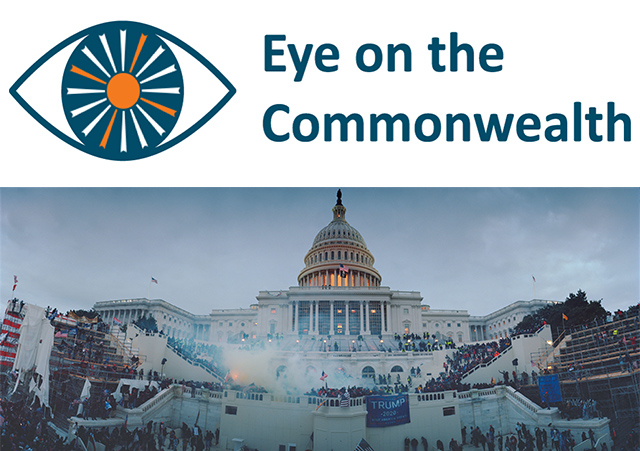 January 6th 2021, DC Capitol riot, last minutes of standoff. Police heavily using tear gas & pushing protesters out of US Capitol Building. [photo: Picture Architect/ Alamy Stock]
January 6th 2021, DC Capitol riot, last minutes of standoff. Police heavily using tear gas & pushing protesters out of US Capitol Building. [photo: Picture Architect/ Alamy Stock]
Commonwealth Update has become Eye on the Commonwealth: after 38 years in print form, Commonwealth Update has moved from the Round Table journal to the Round Table’s website. Originally Commonwealth Notebook, the column became Commonwealth Update in 1993. The new-look Eye on the Commonwealth will seek to provide a perspective on a topical development by the journal’s Commonwealth Update editor, Oren Gruenbaum
The Capitol is attacked and members of Congress killed as far-right Christian fundamentalists seize power: the backstory of Margaret Atwood’s dystopian novel The Handmaid’s Tale, set in a near future when the US becomes the totalitarian republic of Gilead, may no longer be the stuff of fiction, according to a surprising number of academics and analysts.
A year after a mob of white supremacist militiamen and other supporters of Donald Trump stormed the Capitol in an attempted putsch, the idea of US democracy being overthrown is being taken increasingly seriously. ‘Are We Really Facing A Second Civil War?’, asked the New York Times; ‘Is a Civil War Ahead?’, the New Yorker wondered; ‘We Are In a New Civil War’, Politico asserted. Jimmy Carter, the former US president whose foundation has observed 113 elections in fragile democracies since he left the White House, warned: ‘We are at genuine risk of civil conflict and losing our precious democracy.’
Writing in the Globe & Mail, the Canadian political scientist Thomas Homer-Dixon declared that: ‘By 2030, if not sooner, the country could be governed by a right-wing dictatorship.’ The Republican Party, he argued, had become a ‘near-fascist personality cult that’s a perfect instrument for wrecking democracy’. The US was ‘increasingly ungovernable’, he insisted, as ‘bullying, populist white ethnocentrism – a rancid blend of aggrieved attacks on liberal elites, racist dog-whistling, bragging about American exceptionalism and appeals to authoritarian leadership’ became mainstream ideology. How, he asked, should Canada prepare for a possible civil war on its borders?
On 6 January 2021, after Trump urged supporters at his rally to march on Congress to prevent the confirmation of Joe Biden’s election victory, a mob of about 800 broke through police lines, attacked officers and invaded the Capitol, ransacking offices and occupying both houses of Congress as legislators barricaded doors. But, despite video of rioters clubbing police officers, a poll found three in 10 Republicans believe the attack was non-violent. Most Republicans think the mob were ‘protecting democracy’. The conspiracy theories that have long been a key belief of the US far-right have become more entrenched, with Fox TV and even members of Congress claiming that the FBI orchestrated it, that anti-fascists acted as agents provocateurs, that Trump did not incite the mob, and that convicted rioters are political prisoners.
Cheerleaders for Trump, such as the Fox News presenters Tucker Carlson, Sean Hannity and Laura Ingram, have played down the Capitol riot since last January (though at the time they were begging Trump to call off his rioters). Carlson said that because no elected officials were killed and ‘none of the insurrectionists had guns’, it ‘barely rates as a footnote’. A year on, Liz Cheney and her father, the former vice-president Dick Cheney, were the only Republicans present as the House of Representatives held a moment of silence to honour Capitol police officers (several of whom died that day; others were so traumatised that they later killed themselves).
The idea of shadowy forces orchestrating the riot has become part of Trump’s ‘Stop the Steal’ mantra – beliefs similar to the ‘Stab in the Back’ myth that fuelled the Nazis’ rise to power. Most Republicans still believe, despite all evidence, that Biden was not legitimately elected – the Weimar Republic was fatally undermined by just such a delusion. The CIA director, Gina Haspel, told General Mark Milley, chairman of the US joint chiefs of staff: ‘We are on the way to a right-wing coup’, according to the Washington Post‘s Bob Woodward. Mille also feared a coup. ‘This is a Reichstag moment,’ he told aides, accusing Trump of preaching ‘the gospel of the Führer’.
The Economist is not worried: ‘No country as sophisticated, modern, liberal and democratic as contemporary America has ever descended into civil war.’ However, in How Civil Wars Start, Barbara Walter, of the University of California, San Diego, cites key precursors to civil conflict seen now in the US, such as politics revolving around identity and previously dominant groups believing they are losing power and status. ‘What everybody said, whether they were in Baghdad or Sarajevo or Kiev, was “we didn’t see it coming”,’ she told the Observer.
Stephen Marche, in the Globe & Mail, said Canada had long been defined by the US: ‘Now that the American experiment is failing, where does that leave us?’ Canada needed to prepare for ‘American chaos’, he said. Having a protective neighbour had allowed Canadians ‘to forgo realpolitik … the challenge will be to preserve our ideals in the absence of that security.’
Trump is favourite to win the 2024 election. If this happens, said Homer-Dixon, the economic and political risks to Canada would be ‘innumerable’, perhaps ‘existential’. In The Handmaid’s Tale, refugees fleeing Gilead’s theocratic oppression find sanctuary north of the border. How would Canada deal with ‘high-profile political refugees fleeing persecution’ who were wanted by the US regime, wondered Homer-Dixon.
Related articles:
‘Is everything OK?’ – Boris Johnson, sleaze and Peppa Pig – Commonwealth Update
Good Cop26, bad Cop: did UN climate summit succeed or fail? – Commonwealth Update
Barbados: Mottley makes a republic of ‘little England’ – Commonwealth Update



